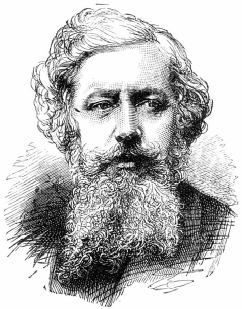George Dawson
 For 32 years one of Birmingham’s most brilliant preachers, lecturers, and leaders. In politics, in education, and in religion he was a mighty power. In private life he was the charm of all who knew him, and was revered and loved by all. The statue to his memory stands at the back of the Town Hall, and his bust in the Reference Library near to the Shakespeare Library that he loved so much. Thirty-
For 32 years one of Birmingham’s most brilliant preachers, lecturers, and leaders. In politics, in education, and in religion he was a mighty power. In private life he was the charm of all who knew him, and was revered and loved by all. The statue to his memory stands at the back of the Town Hall, and his bust in the Reference Library near to the Shakespeare Library that he loved so much. Thirty-
The memorial reads:-
In loving memory of GEORGE DAWSON M. A. born 24th February 1821 died 30th November 1876. "Coming to Birmingham in 1844 he became a great power for good in all questions affecting the religious, political, municipal & educational events of the town of his adoption. In religion, his teaching was free from the limitations of creed and full of reverence for all forms of sincere faith being inspired by a firm belief in the fatherhood of God and the brotherhood of man. In politics he was fearless but wide reformer ever insisting on the equal claims of duty and right. Plinth: A few of his old friends recorded their love and gratitude for his teaching by the erection of this monument. Lower panel: W A -
Sue’s Comments:-
George Dawson (24 February 1821 – 30 November 1876) was an English nonconformist minister and philanthropist. He was born in London, where his father Jonathan Dawson ran a school but he was sent away to be educated in Scotland. He came to Birmingham where he preached at the Mount Zion Baptist Chapel, in Birmingham. However he left the Baptist church in 1847 to become Minister in the Unitarian church. He married Susan Frances Crompton and by 1851 they had 2 children, Rachael Ann (named after his mother) and Bernard and had made their home in Kings Norton. He was an advocate of 'Free Education' and encouraged his congregation to 'christian work', especially for the people of Birmingham. He also lectured in many other towns and was well known throughout the whole country.
He died suddenly at his home in Kings Norton on 30 November 1876, and is buried in Key Hill Cemetery. His Will was proved in December of that year at Worcester by his widow and his son Bernard, who by this time was a Civil Engineer working in Lincolnshire. He has an entry in the Dictionary of National Biography and there is more about his life and work in a Wikipedia entry.
Sue (JQRT Member)